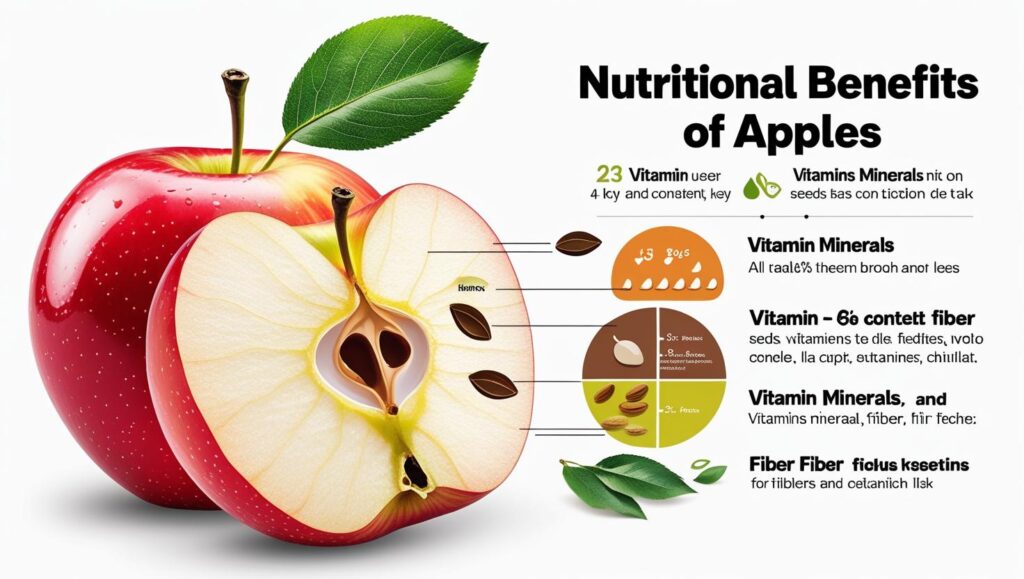You’ve probably heard the saying: “An apple a day keeps the doctor away.” But how true is that? And how many calories are in an apple? In this article, we’re diving deep into apple nutrition facts to uncover why this simple fruit is considered a powerhouse of health benefits.
Whether you’re wondering how apples help with weight management, heart health, or blood sugar levels, or just want to know how nutrient-rich they are, this is the guide for you. We’ll explore how apples support overall health, how different types vary, and why they truly are deliciously healthy. Read on to find out why eating an apple might be one of the easiest steps you can take toward better health.
1. What Are the Nutrition Facts of an Apple?
Let’s start with the basics. According to the USDA, apple nutrition facts for one medium apple (about 182 grams) include:
- 95 calories
- 25 grams of carbohydrates
- 4 grams of fiber
- 14% of the daily value of vitamin C
- 0 grams of fat
- 0 grams of cholesterol
Apples are a good source of fiber and antioxidants, including quercetin, catechin, and chlorogenic acid, all of which protect your cells from damage caused by free radicals.
2. How Many Calories Are in an Apple?
You may be wondering how many calories are in an apple. It depends on the size:
- 1 small apple (about 150g): ~52 calories
- One medium apple: ~95 calories
- One large apple: ~115–130 calories
Despite their sweetness, apples are low in calories, which makes them ideal for weight-conscious eaters. Because apples are packed with fiber, they help you feel greater satisfaction and avoid unnecessary extra calories from snacks.
3. Why Are Apples So Good for You?

Apples offer an impressive list of health benefits while being convenient and delicious. They are:
- Naturally low in fat and sodium
- Rich in fiber, especially pectin, which supports digestion
- Loaded with antioxidants like quercetin
- Hydrating, thanks to their high water content
Their unique combo of fiber and antioxidants makes apple nutrition a win for your overall health. That’s why so many doctors still say an apple a day keeps the doctor away!
4. What Are the Top Health Benefits of Apples?
The health benefits of apples go beyond just basic nutrition facts. Studies show apples may help:
- Lower blood cholesterol
- Reduce risk of heart disease and stroke
- Decrease the chance of developing type 2 diabetes
- Improve gut health by feeding good bacteria
- Reduce inflammation thanks to their anti-inflammatory properties
Plus, apples may reduce your risk of colorectal cancer and other types of cancer, thanks to their phytochemical and antioxidant compounds.
5. Does Eating One Small Thing Help With Weight Management?
Yes! Eating an apple regularly can support weight management because:
- Apples are low in calories and rich in fiber, which helps you feel fuller longer
- They help reduce cravings for ultra-processed snacks
- A medium-sized apple has no fat or cholesterol and only about 95 calories
One study even found that people who ate two apples daily lost more weight compared to those who didn’t. That’s why consuming apples is often part of a smart diet plan.
6. Can Apples Improve Heart and Gut Health?
Absolutely. Apples contain pectin, a type of soluble fiber that:
- Helps lower LDL cholesterol
- Supports gut health by promoting the growth of beneficial bacteria
- Reduces the risk of heart disease and supports blood sugar levels
That crisp apple slice isn’t just tasty—it’s protecting your heart and helping your digestive system at the same time!
7. Do Apples Help Lower Cholesterol?
Yes. Apples are particularly effective at helping lower LDL cholesterol (the “bad” kind):
- Apples contain both soluble and insoluble fiber, which removes cholesterol from the digestive tract
- Quercetin, an antioxidant found in apples, also supports heart health
- Studies show that eating an apple a day can lead to noticeable improvements in cholesterol levels
Two apples per day may be enough to see real heart-health benefits.
8. How Do Apples Affect Blood Sugar and Type 2 Diabetes?

While apples do contain natural sugar, they have a low glycemic index and are rich in fiber, which slows down sugar absorption. That means apples may help:
- Stabilize blood sugar levels
- Reduce the risk of developing type 2 diabetes
- Improve insulin sensitivity over time
The combination of fiber, antioxidants, and nutrients makes apples a smart choice—even for those watching their sugar intake.
9. What Nutrients Do Apples Contain?
Apples are rich in essential nutrients that support many functions in your body:
- Vitamin C – Supports immune health and skin
- Potassium – Helps regulate blood pressure
- Phytochemical antioxidants – Protect against cancer and cell damage
- Fiber – Aids in digestion, cholesterol management, and weight management
So whether you’re slicing a fresh apple, drinking apple juice, or baking a homemade apple pie, you’re still getting nutritional facts that support health.
10. What’s the Best Way to Eat Apples for Maximum Benefits?
To get the most from apple nutrition, consider these tips:
- Eat apples whole with the skin—many nutrients are in or near the skin
- Choose different types of apples, like Fuji, Granny Smith, or Honeycrisp, for variety
- Add apple slices to oatmeal or salads for a boost in fiber and antioxidants
- Avoid sugary options like apple pie or applesauce loaded with added sugars. Stick with fresh apples or unsweetened apple juice for better results.
Quick Summary: What to Remember About Apple Nutrition Facts
- One medium apple has about 95 calories, 4g fiber, and is high in vitamin C.
- Apples are rich in fiber, antioxidants, and phytochemicals like quercetin.
- They help lower cholesterol, stabilize blood sugar, and support heart and gut health.
- Eating an apple can aid in weight management and reduce cravings.
- Apples may help lower the risk of type 2 diabetes and cancer.
- Always eat apples with the skin on to get the full nutrient benefits.
- Apples are a delicious, healthy snack—low in calories but high in value.
- “An apple a day keeps the doctor away” isn’t just a saying—it’s based on science!
Let apples be your favorite daily habit—they’re tasty, versatile, and great for your overall health.
FAQ: Benefits Of Eating Apples
Q1: How many calories are in 1 full apple?
A1: A medium-sized apple has about 95 calories.
Q2: Is eating an apple a day good for weight loss?
A2: Yes, apples are low in calories and high in fiber, which helps you feel full. Eating one apple a day can support weight loss when part of a healthy diet.
Q3: How many apples are 500 calories?
A3: Since one apple has about 95 calories, around five apples would equal 500 calories.
Q4: How many calories are in an apple?
A4: A typical apple has about 95 calories, depending on its size and type.
Q5: How many apples are 1000 calories?
A5: It would take about 10 medium apples to reach 1000 calories.





